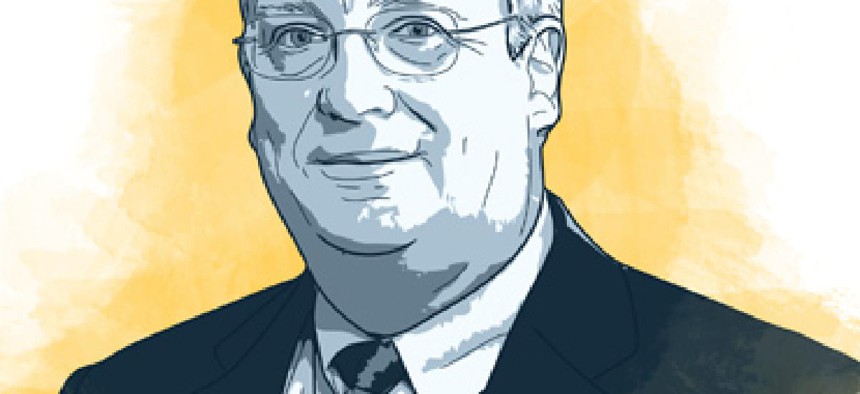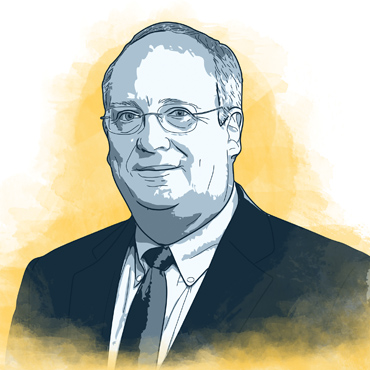David Wennergren: The exit interview

As he wrapped up 32 years of government service, the Defense Department's assistant deputy chief management officer spoke with FCW about leadership and the importance of understanding people.

As he wrapped up 32 years of government service, the Defense Department's assistant deputy chief management officer spoke with FCW about leadership and the importance of understanding people.
You've spent more than three decades in government, much of it focused on IT. How is technology changing the way agencies work?
Wennergren: It's been fascinating to watch how technology has changed. People can do self‑service, and a young naval lieutenant can go home tonight and go mash up some new application and post it someplace where it can actually be used tomorrow. The days of an IT solution taking months and months, and a bunch of programmers walled up away someplace, are behind us.
It's taken government agencies a long time to get to that point because we have such complexities in our processes. We're still grappling with [fixing] the process first so you can leverage the new technology, rather than building customized solutions. But you're seeing more and more that people are able to develop capabilities so much more rapidly.
What does that technology empowerment mean at the management and strategy levels?
Wennergren: It's a fascinating conundrum because the speed with which new things can be delivered, and the ability to take advantage of what other people have done and reuse [it] or let somebody else be a service provider — all of those things should be able to help you get your job done better, faster, cheaper.
But so often you have the challenge of "I'm uncomfortable with the new way of doing it," and "I'm uncomfortable that I have to rely upon somebody else."
We still tend to be a little bit of control freaks and feel a lot more comfortable when we own the money, own the people and own the ability to control all aspects of the new solution. But if you want to take advantage of this service‑oriented, Web 2.0 world, it's all about somebody else can provide a service that you can consume, so you're going to have to trust and rely upon others to help you get the mission done.
That trust requires trustworthy colleagues. How do you bring in the right people and give them the right guidance and encouragement to tackle today's challenges?
Wennergren: If you were drawing the three circles of IT leadership — first, there's a lot of regulation in the IT space, and you've got to follow the laws, all that kind of stuff. But that circle is very backwards-looking because it takes a long time from the time either a new idea happens or a problem occurs until such time as you get new rules in place.
Then the second sphere is, "What does your customer want?" And if you're not delighting the customer, then shame on you as an IT professional. But the customer sphere is hopelessly focused on today. The customers can only ask for what they see.
Then there's this third sphere that's like the strategic-thinking sphere, the circle of what's new and possible. And what I find is information leaders have to follow their regulations so they're focused on compliance, they have to delight the customer so they're focused on, "What can I get them right now that would help them?" — and [therefore] they don't spend enough time on the third circle. If you don't spend time on that third circle, you inevitably fall short.
You have to find ways to make sure that the IT leadership team isn't falling behind by giving them opportunities to be able to see the future, see what the art of the possible is and figure out how to use it.
When you're building a team, what skills do you look for? What's the most important talent that brings a résumé or a candidate to the top of your list?
Wennergren: Clearly you need people who understand how technology can be used and what the art of the possible is in terms of the technology revolution that we're all part of. I would describe that as necessary but not sufficient.
I think, more and more, you've got to have a broader game. You have to be savvy about the human side of this and how you can work across organizational boundaries with disparate groups [and] not necessarily just build consensus but find a collaborative way to reach the right answer so that you can move forward rapidly.
I see many times that people have very strong technical skills, but they don't have the ability to turn the technical solution into a permanent reality because they're not as adept at understanding the mission of the organization.
I'm very interested in people who can combine technical skills with the ability to communicate well and turn technical conversations into conversations about outcomes that matter to the leadership of the organization.
Let's talk about change management. Do the new technologies and the changing culture of government make it harder or easier?
Wennergren: I think that you have a combination of factors. One is human nature, right? The majority of people are very comfortable. They'll be change neutral or perhaps change averse.
If you think about it, why wouldn't you be because how did you become the successful professional that you are? Part of it was your keen intellect and charming wit and all that kind of stuff. But a lot of it is you become very adept at how the organizational processes work. When something radically changes that's going to perhaps make your expertise less relevant going forward, it's only natural that you might be reluctant to change.
Yet in today's world, the pace of technological change is so much more rapid every year that all those nagging cultural change problems of the past are, I would say, magnified now. The skills that brought you to today will not necessarily be the skills that will take you into the future.
The need to take that risk — the need to be able to step out of your comfort zone and take that step into the new — is just ever more important. Trying to help people cope with how you can create structures where you can maintain a sense of urgency, build trust, overcome some of the risk aversion that you have, be able to use data so that you're making decisions based on truth rather than on fear and anecdote — those kinds of things, I think, are more crucial today than ever before.
NEXT STORY: Will Coburn lift Archuleta hold?


